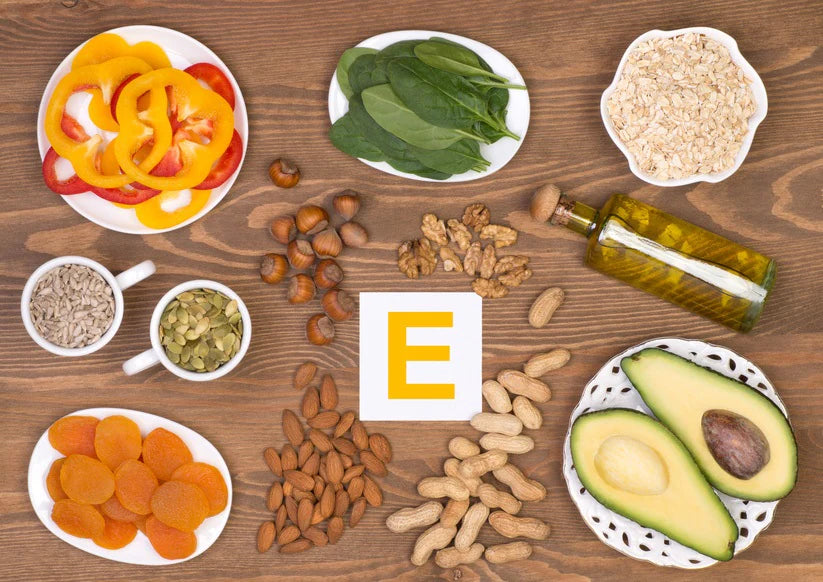Vitamin E is one of the most powerful and versatile antioxidants in the world of nutrition, playing a critical role in protecting your cells from damage, supporting immune function, and promoting skin and heart health. While it often takes a backseat to vitamins like C or D in the spotlight, Vitamin E’s benefits are wide-ranging and essential for maintaining long-term well-being.
Let’s explore what makes Vitamin E so special and how you can ensure you’re getting enough of this crucial nutrient in your diet.
What is Vitamin E?

Vitamin E refers to a group of fat-soluble compounds that include tocopherols and tocotrienols. These compounds act as powerful antioxidants, which means they help protect the body from oxidative stress caused by free radicals—unstable molecules that can damage cells and contribute to aging and disease.
Among the eight different forms of Vitamin E, alpha-tocopherol is the most biologically active in the human body, making it the primary form found in supplements and food sources. Once absorbed, Vitamin E is stored in the body’s fatty tissues and used to protect cells, particularly cell membranes, from oxidative damage.
Vitamin E as a Potent Antioxidant

One of Vitamin E’s standout features is its role as a potent antioxidant. Free radicals are byproducts of normal metabolic processes, but factors like pollution, smoking, and excessive sun exposure can increase their levels in the body. If left unchecked, these free radicals can cause oxidative stress, leading to cellular damage, inflammation, and a range of health issues, including heart disease, cancer, and premature aging.
Vitamin E helps neutralize these free radicals, protecting the body’s cells and tissues from oxidative damage. This protective effect is especially important for cells in organs like the heart, skin, and eyes, which are constantly exposed to environmental stressors.
Vitamin E and Skin Health

Vitamin E is widely known for its benefits to skin health, making it a popular ingredient in skincare products. As a fat-soluble antioxidant, Vitamin E is particularly effective in protecting the skin from oxidative stress caused by sun exposure and pollution. This helps prevent premature aging and the development of fine lines, wrinkles, and age spots.
Additionally, Vitamin E helps to improve skin moisture retention by strengthening the skin’s barrier function. It’s also commonly used in products designed to soothe irritated or inflamed skin due to its anti-inflammatory properties.
Some key skin benefits of Vitamin E include:
- UV protection: While it doesn't block UV rays, Vitamin E helps protect skin cells from UV-induced damage, reducing the risk of sunburn and long-term skin damage.
- Healing properties: Vitamin E can help speed up wound healing and minimize the appearance of scars by promoting skin regeneration.
- Moisturizing effects: Vitamin E supports the skin's ability to retain moisture, which is particularly beneficial for people with dry or sensitive skin.
Whether applied topically or taken as a supplement, Vitamin E is a key player in maintaining smooth, healthy skin.
Heart Health Benefits of Vitamin E

In addition to its skincare benefits, Vitamin E is important for cardiovascular health. As an antioxidant, Vitamin E helps protect the arteries from oxidative damage, which can contribute to the buildup of plaque—a condition known as atherosclerosis. This plaque buildup increases the risk of heart disease, stroke, and other cardiovascular issues.
Vitamin E has also been shown to:
- Improve circulation: By preventing blood clots and promoting healthy blood vessel function, Vitamin E helps improve overall circulation.
- Reduce inflammation: Chronic inflammation is a major risk factor for heart disease, and Vitamin E’s anti-inflammatory properties help lower this risk.
- Lower LDL cholesterol oxidation: While Vitamin E doesn’t directly lower LDL (bad) cholesterol levels, it prevents the oxidation of LDL cholesterol, which is a key factor in the development of atherosclerosis.
By supporting heart health, Vitamin E helps lower the risk of cardiovascular events and promotes long-term heart function.
Vitamin E and Immune Function
Vitamin E also plays a critical role in boosting immune function. It helps maintain the health of T-cells, which are a type of white blood cell responsible for defending the body against infections. Research shows that adequate Vitamin E intake can enhance immune responses, particularly in older adults whose immune function naturally declines with age.
By supporting the immune system, Vitamin E helps the body fight off infections and recover more quickly from illness. It’s particularly important for individuals with compromised immune systems or those prone to frequent illnesses.
Eye Health and Vision Protection

Vitamin E is vital for maintaining healthy eyes and protecting vision, particularly as we age. Oxidative stress can contribute to the development of cataracts and age-related macular degeneration (AMD), two of the most common causes of vision loss in older adults.
Studies suggest that Vitamin E’s antioxidant properties help protect the eyes from oxidative damage caused by free radicals, which can lead to these conditions. By reducing oxidative stress in the eyes, Vitamin E may help slow the progression of AMD and reduce the risk of cataracts, making it an important nutrient for maintaining long-term eye health.
Recommended Japanese Vitamin E Supplements

DHC Natural Vitamin E[Soy]:
DHC's Natural Vitamin E [Soy] contains 301.5mg of natural d-α-tocopherol, the most active form of Vitamin E, per capsule, meeting the daily recommended intake. This supplement is ideal for individuals with dry skin, sensitivity to cold, muscle stiffness, insufficient vegetable intake, or those looking to maintain their health during middle age and beyond. Often called the "anti-aging vitamin," Vitamin E not only promotes beauty but also improves blood circulation and helps prevent cold sensitivity. Since foods rich in Vitamin E, like pumpkins, nuts, and oils, are often limited during dieting, this convenient supplement ensures adequate intake to support youthful and healthy living.
Dear Natura Vitamin E:
Each capsule contains 140mg of Vitamin E, making it ideal for those looking to maintain a youthful and vibrant appearance. This supplement is free from additives, offering a natural, food-based blend of vitamins that promotes overall vitality. Certified under Japan's ISO22000 food safety standards, Dear Natura ensures a safe and healthy product with no artificial colors or fragrances. You can confidently include this supplement in your daily routine to support youthful energy and well-being.
Kobayashi Pharmaceutical Vitamin E:
If you're looking for a product that supports both beauty and health, this supplement is perfect for you. Each capsule contains 314mg of vitamin E-rich plant oil, providing 284.4mg of Vitamin E. It helps maintain your beauty and well-being, making it ideal for today's busy lifestyle.
Recommended for:Individuals who wish to enhance both their beauty and health, especially those with a hectic schedule.
Sources of Vitamin E

Vitamin E is abundant in many foods, particularly plant-based oils and nuts. Here are some of the best dietary sources of Vitamin E:
- Nuts and seeds: Almonds, sunflower seeds, and hazelnuts are all excellent sources of Vitamin E.
- Vegetable oils: Sunflower oil, safflower oil, and wheat germ oil contain high levels of Vitamin E.
- Green leafy vegetables: Spinach, kale, and broccoli provide a good amount of Vitamin E.
- Fortified foods: Some cereals, fruit juices, and spreads are fortified with Vitamin E to help meet daily intake requirements.
Most people can get enough Vitamin E through a balanced diet, but supplements are available for those who need additional support.
How Much Vitamin E Do You Need?
The recommended daily intake of Vitamin E depends on age and life stage. Here’s a general guide for the recommended daily allowance (RDA):
- Adults: 15 mg (22.4 IU)
- Pregnant women: 15 mg (22.4 IU)
- Breastfeeding women: 19 mg (28.4 IU)
Though it’s rare, a deficiency in Vitamin E can lead to nerve and muscle damage, as well as weakened immune function. However, since Vitamin E is fat-soluble, it can accumulate in the body, so it’s important not to exceed the recommended dosage when taking supplements.
Choosing the Right Vitamin E Supplement

If you’re considering taking a Vitamin E supplement, there are a few things to keep in mind. Vitamin E supplements are available in two forms: natural (d-alpha-tocopherol) and synthetic (dl-alpha-tocopherol). Natural Vitamin E is better absorbed by the body and is generally considered more effective than synthetic versions.
Supplements come in various forms, including softgel capsules, liquid, and topical oils, allowing you to choose the option that best fits your lifestyle.
Conclusion: Vitamin E for a Healthier You
Vitamin E offers a range of health benefits, from protecting your skin and eyes to supporting heart and immune function. As a powerful antioxidant, it helps shield your body from the damaging effects of free radicals, promoting overall wellness and longevity.
Whether you’re looking to improve your skin’s appearance, boost your heart health, or enhance your immune defenses, Vitamin E is a nutrient that deserves a place in your daily routine. With plenty of food sources and supplements available, it’s easy to ensure you’re getting enough Vitamin E to support your long-term health.




